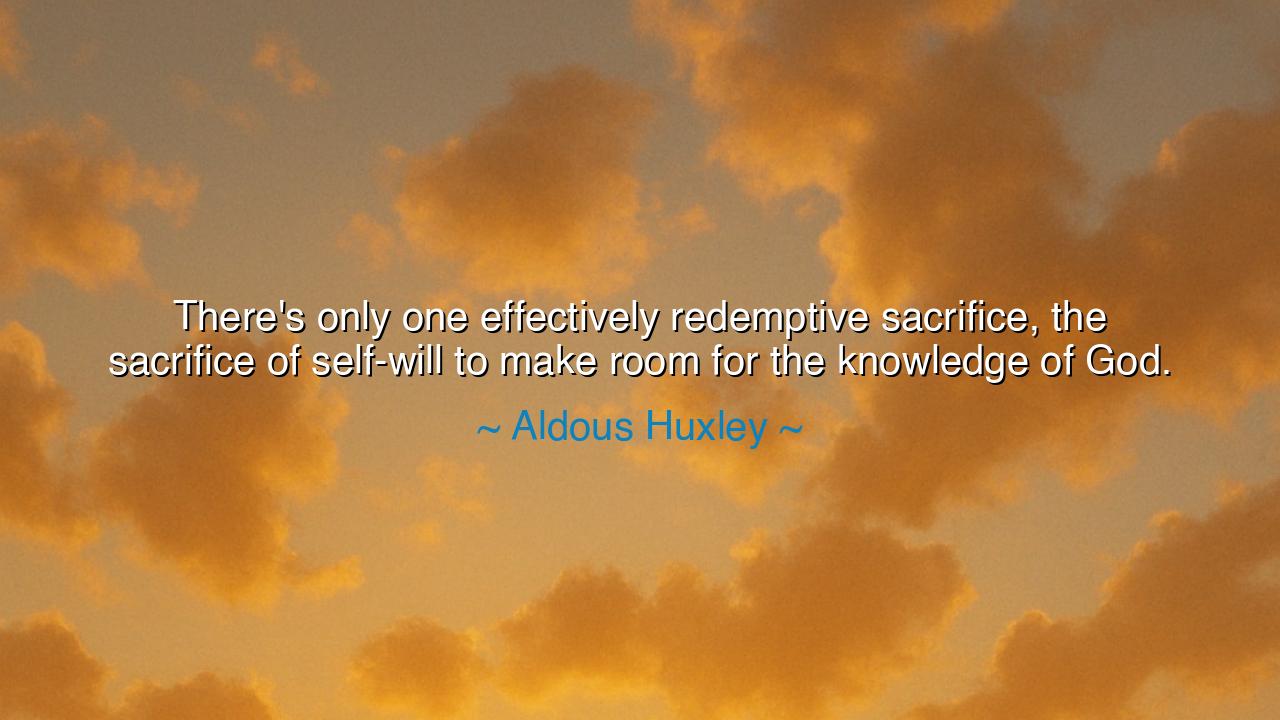
There's only one effectively redemptive sacrifice, the sacrifice
There's only one effectively redemptive sacrifice, the sacrifice of self-will to make room for the knowledge of God.






Hear now, O children of wisdom, the truth that echoes through the ages! Aldous Huxley, a man whose thoughts stirred both the intellect and the spirit, spoke these powerful words: "There's only one effectively redemptive sacrifice, the sacrifice of self-will to make room for the knowledge of God." These words, simple yet profound, carry within them the essence of a truth as old as time itself. For what is it to be truly redeemed, not merely in outward appearance but in the depths of the soul? It is the relinquishing of one’s own will, the surrender of the ego, so that the knowledge of God may enter and transform the heart.
In every age, mankind has wrestled with the impulse of self-will — that powerful force that drives the soul to pursue its own desires, to chart its own course, to be master of its own fate. And yet, it is this very will that so often leads us astray. Self-will is the root of pride, of ambition, of the striving for glory that disregards the needs of others. It is the cause of our separation from the divine, for it places our desires above the will of God, and in doing so, closes our hearts to the wisdom and grace that He offers. Huxley’s words invite us to consider: what if, instead of clinging to our own will, we made the ultimate sacrifice, the sacrifice of self, in order to make space for something greater?
Consider the tale of Jesus in the Garden of Gethsemane, where, on the night before His crucifixion, He wrestled with His own will. His heart was heavy, for He knew the pain and suffering that awaited Him. And yet, He prayed, “Not my will, but Thine be done.” In this moment of agony, Jesus made the greatest sacrifice: He laid down His own desire for comfort and safety, surrendering His will to the will of the Father. This is the redemptive sacrifice Huxley speaks of — the surrender of self-will in the service of something far greater than ourselves. In that surrender, Jesus opened the way for the knowledge of God to be fully revealed, not just in His life, but in the life of all who would follow Him.
Let us not think that self-will is a mere inconvenience or a fleeting temptation. It is a powerful force that shapes our every action, our every thought, our every desire. It is the force that leads us to build our kingdoms and defend our pride, often at the expense of others. Yet, when we sacrifice that will, we open ourselves to a higher wisdom, a deeper understanding of life, of the divine, and of our true purpose in the world. This is the redemptive power Huxley speaks of: not a sacrifice for sacrifice's sake, but a sacrifice that clears the way for the divine to fill us, to guide us, to transform us.
Consider the example of Socrates, the philosopher who knew well the power of self-will. He did not seek fame or wealth, nor did he desire to conform to the norms of his society. His self-will was not one of personal ambition but of intellectual autonomy. Yet, in his final moments, as he faced the judgment of the Athenian court, he laid down his will. He accepted death, not in rebellion but in peaceful surrender, for he knew that the pursuit of truth — the pursuit of the knowledge of God — required a heart unencumbered by the chains of pride and ego. Socrates’ life and death were a testimony to the redemptive power of surrender, a reminder that wisdom comes not from clinging to our own desires but from yielding to the higher truth.
The lesson, then, is clear: the sacrifice of self-will is not a loss but a gain of something far greater. When we let go of our need to control, our need to possess, our need to be the center of the universe, we create space for the divine to work within us. We make room for the knowledge of God — not a theoretical knowledge, but a deep, living understanding that transforms the way we see the world, ourselves, and others. This is the redemption Huxley speaks of: not a redemption of outward circumstance, but a redemption of the heart, a lifting of the soul to the divine plane where we see the world through the eyes of wisdom, compassion, and grace.
So, how shall we apply this wisdom to our lives? Begin by recognizing the forces of self-will that drive you. In moments of decision, ask yourself: Is this desire for control truly in service of the good, or is it a barrier to the divine? Learn the art of surrender — not to the world or its demands, but to the will of God, that His wisdom may fill you. Sacrifice your pride, your ambition, your need for approval, and in that sacrifice, make room for the knowledge that will redeem you, transform you, and lead you to the life of true purpose.
In the end, the redemptive sacrifice is not a sacrifice of suffering, but a sacrifice of the ego, a surrender that opens the door to divine knowledge and eternal wisdom. Let God’s will reign in your heart, and in that surrender, you will find freedom, peace, and a deeper understanding of the divine plan for your life. This is the path of true redemption, the way that leads not only to wisdom but to the heart of God Himself.






AAdministratorAdministrator
Welcome, honored guests. Please leave a comment, we will respond soon